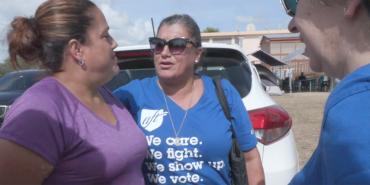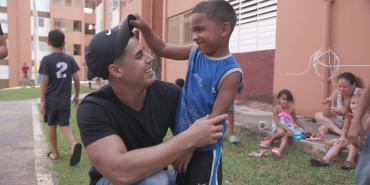The passion and power of AFT activism were on display once again July 29 as AFT Executive Vice President Evelyn DeJesus helped kick off a discussion of economic issues for working families.
“Today I would like to talk about our sisters and brothers in Puerto Rico and how, in the AFT, we care, we fight and we show up for these members,” she said. “We showed up after the hurricanes in 2017. We showed up after the earthquakes early this year. And now we are fighting together in this COVID-19 pandemic.”
DeJesus, a highly accomplished teacher from New York City whose parents were born in Puerto Rico, said, “This island is very close to my heart.”
She visited Puerto Rico with AFT President Randi Weingarten early this year, after earthquakes did terrible damage around the city of Ponce. The AFT showed up for our members in the Asociación de Maestros de Puerto Rico, even as the federal government failed to help.
Together with our partners, AFT members raised $500,000 and donated first-aid kits, tents and solar-powered lights delivered at four ports by members of the Seafarers International Union. The tents provided temporary classrooms in some of the hardest-hit areas, where thousands of homes, schools and commercial buildings were destroyed or damaged.
As always, AFT members were the first responders and the essential workers.
Two years earlier, after Puerto Rico took a pounding from a series of storms, notably Hurricane Maria, the AFT partnered with a broad swath of unions and relief organizations to run Operation Agua, which provided more than 100,000 water filters directly to families and schools without access to water.
“We made sure that every single school could provide clean, healthy drinking water,” DeJesus said. Operation Agua was part of a giant, union-powered relief mission to Puerto Rico in which hundreds of nurses flew to there to help with relief efforts.
While the AFT was supporting students and their communities, the Trump administration was trying to take advantage of the disaster to close hundreds of schools and turn the rest into charters. The AFT and the AMPR fought back.
When the earthquakes hit, rebuilding from the hurricanes was far from done and Puerto Ricans were still fending off a series of disastrous privatization schemes. President Trump, who had ignored the realities brought by the hurricanes, now ignored the massive damage done by this new barrage.
But five days later, the AFT was there. No one had a plan to open schools until we brought tents to use as temporary classrooms, DeJesus said. And no one had a plan to meet the needs of displaced kids, until we worked with First Book to make sure they had books.
But the island’s problems are not just natural disasters. For decades, DeJesus said, Puerto Ricans have faced economic hardships, from poorly funded public health and education systems to inadequate housing and financial services.
And now, the coronavirus pandemic has reached Puerto Rico. Once again, the governments in San Juan and Washington have failed to care and show up for their people. Because Trump doesn’t think Puerto Ricans are Americans, federal relief funds have been slow to reach our fellow citizens. And once again, the AFT is stepping in to provide personal protective equipment and expertise in healthcare and disaster relief.
“The pandemic has made everything much worse,” she lamented. More than two years later, some Puerto Ricans are still waiting on insurance checks from Hurricane Maria. But the AFT has stood with the AMPR throughout these crises, even as a corrupt secretary of education closed hundreds of schools and tried to “charterize” the rest.
Now, as they plan for the upcoming school year, educators and families face enormous obstacles. If Puerto Rico were a state, it would be the poorest state in the union. One key statistic for our times: More than 40 percent of homes there do not have adequate broadband access for distance learning.
However, the AFT and the AMPR will stand strong with students as they struggle to overcome these barriers, DeJesus said. “We are not going away.” This is the moment, she said, “when we either invest in our future or we forfeit it.” Our nation must prioritize essential public services.
“Thank you for giving me the opportunity to speak with you about a place so close to my heart,” she said. “Gracias.”
Watch the executive vice president’s full video here.
[Annette Licitra]


